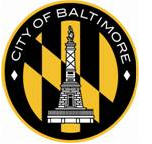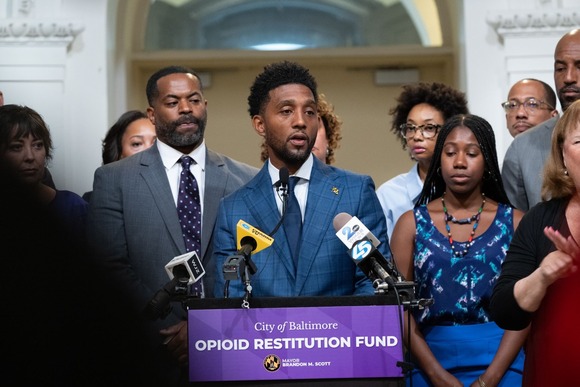Mayor Scott Issues Executive Order Outlining Administration of Opioid Restitution Funds
Thursday Aug 29th, 2024

FOR IMMEDIATE RELEASE
City Immediately Allocating $20 Million of Restitution Funds to Baltimore City Health Department, New Executive Order Establishes Governance Structure and Trust for Remaining Restitution Funds
Executive Order Builds On Nationwide Best Practices, Centers Community Involvement, Transparency, And Accountability

BALTIMORE, MD (Thursday, August 29, 2024) - Today, Mayor Brandon M. Scott, alongside city and state leaders, advocates, care providers, and residents who are working on the frontlines to combat opioid overdoses, signed an Executive Order establishing a comprehensive framework for the administration of opioid restitution funds in the City of Baltimore. The order follows recent announcements of settlement funds won by the City against major pharmaceutical manufacturers and distributors, now totaling $242.5 million. The City remains engaged in litigation against several other opioid manufacturers and distributors who make up the largest market share and trial is set to begin on September 16th.
"Every community has been inflicted with the pain of the opioid overdose epidemic, but here in Baltimore, we have been disproportionately impacted - particularly due to the actions of reckless bad actors in big pharma," said Mayor Brandon M. Scott. "We made the decision to see our litigation against these companies through until the very end, foregoing the global settlements that were offered along the way, because we knew how impacted our community has been and how important it was to see adequate financial accountability from these companies. But it isn't enough to win the funds - we need to put them to work. This Executive Order will ensure that restitution funds are governed responsibly, transparently, and effectively in order to support our residents and communities most affected by the epidemic - not just during this administration, but for years to come."
In today's announcement, Mayor Scott outlined his intent to immediately bolster the Baltimore City Health Department's active and ongoing work to combat the overdose epidemic through a new $20 million allocation. In the settlements, $42 million has already been allocated to specific care providers and organizations working to tackle substance use disorder and the impact it has on neighborhoods, including: $5 million to Charm City Care Connection, $5 million to the Peer Navigators program at the Enoch Pratt Free Library, $5 million for the Law Enforcement Assisted Diversion program, $5 million for Healing City Baltimore, $1 million for Roberta's House, $1 million for From Prison Cells to PhD, $5 million to Tuerk House, $5 million to Helping Up Mission, $3 million for Baltimore Safe Haven, $3 million for HOPE Safe Haven, $2 million for More Than a Shop, $1 million for Marian House, and $1 million for Turnaround Tuesday.
The governance structure outlined in the executive order will manage the remaining funds in the settlement awards and any future funds secured through settlements or at trial in the ongoing litigation. As noted in the executive order, the City will pursue a robust community engagement effort to ensure Baltimore's residents play a key role in directing the use of these funds and are able to see the impact directly in their communities. The community engagement strategy will include in-person and virtual town hall style meetings, focus groups, and an online survey where residents can submit ideas and feedback. More information on the community engagement events will be released at a later date.
The executive order was crafted by the Mayor's Office, in partnership with the Baltimore City Health Department, Department of Finance, and Mayor's Office of Recovery Programs. Sara Whaley, the Program Director of the Bloomberg Overdose Prevention Initiative at the Bloomberg School and a senior practice associate at the School, was key to advising the City during the development of the Executive Order. She is considered a national expert on use of settlement funds and has advised states across the country on best practices for spending opioid settlement funds, as well as being the lead author and organizer of "The Principles for the Use of Funds from the Opioid Litigation," considered the outline for national best practices for states and localities who receive these funds.
"With this Executive Order, Baltimore will establish a clear governance structure for the use of restitution funds that centers community involvement, transparency, and accountability," said Sara Whaley. "This order is based on best practices from around the country and lays a foundation to ensure funds will have the greatest impact by protecting the dollars and ensuring their longevity, thinking holistically about the role of restitution funds as part of a broad overdose response, and rooting decision-making in the expertise of a diverse set of voices."
Key provisions in the Executive Order include:
- Establishment of the Baltimore City Opioid Restitution Fund
- The creation of parameters for spending the funds, including special focus on funding programs, services, and infrastructure related to prevention, treatment, recovery, harm reduction, social determinants of health, and other programs targeting harms caused by the opioid epidemic.
- Establishment of a Trust to sustain the impact of these funds in the community for at least 15 years.
- Requirement for the City to publish a comprehensive overdose reduction strategy based on evidence, conduct a community needs assessment, create a robust community engagement plan, and create a transparency and accountability plan at least once every two years, as well as annual reports to the Mayor and City Council.
- Establishment of two new positions in the Mayor's Office: an Executive Director of Overdose Response and an Opioid Restitution Program Manager.
- Establishment of a Restitution Advisory Board, made up of community members, including those with lived experience with substance use, professional practitioners, elected leaders, and senior administration officials or Mayoral appointees to guide the use of the City's restitution.
Residents interested in applying to serve on the Restitution Advisory Board can do so immediately. The application can be found here.
The full Executive Order as well as more information is available here on the City's website.